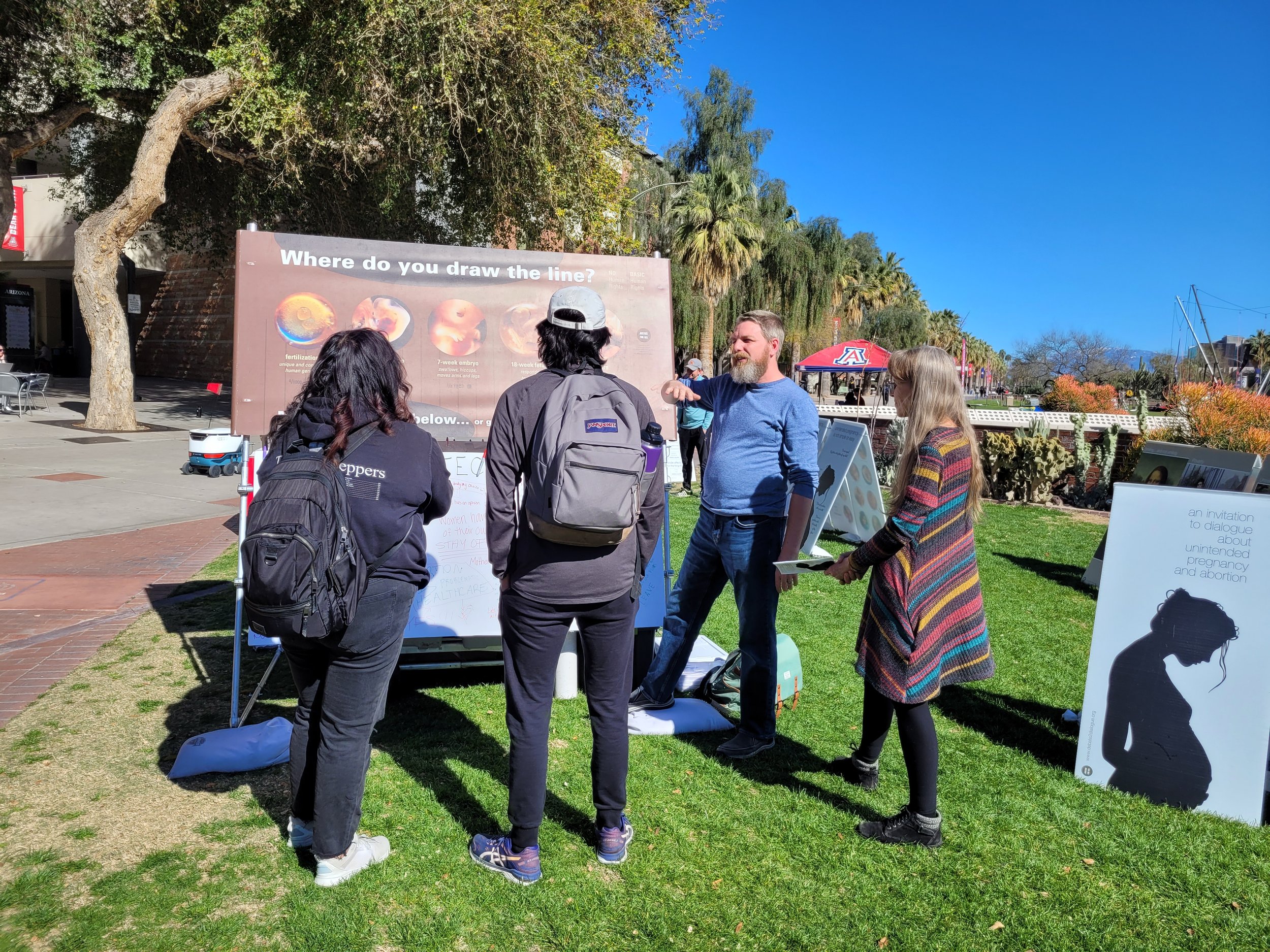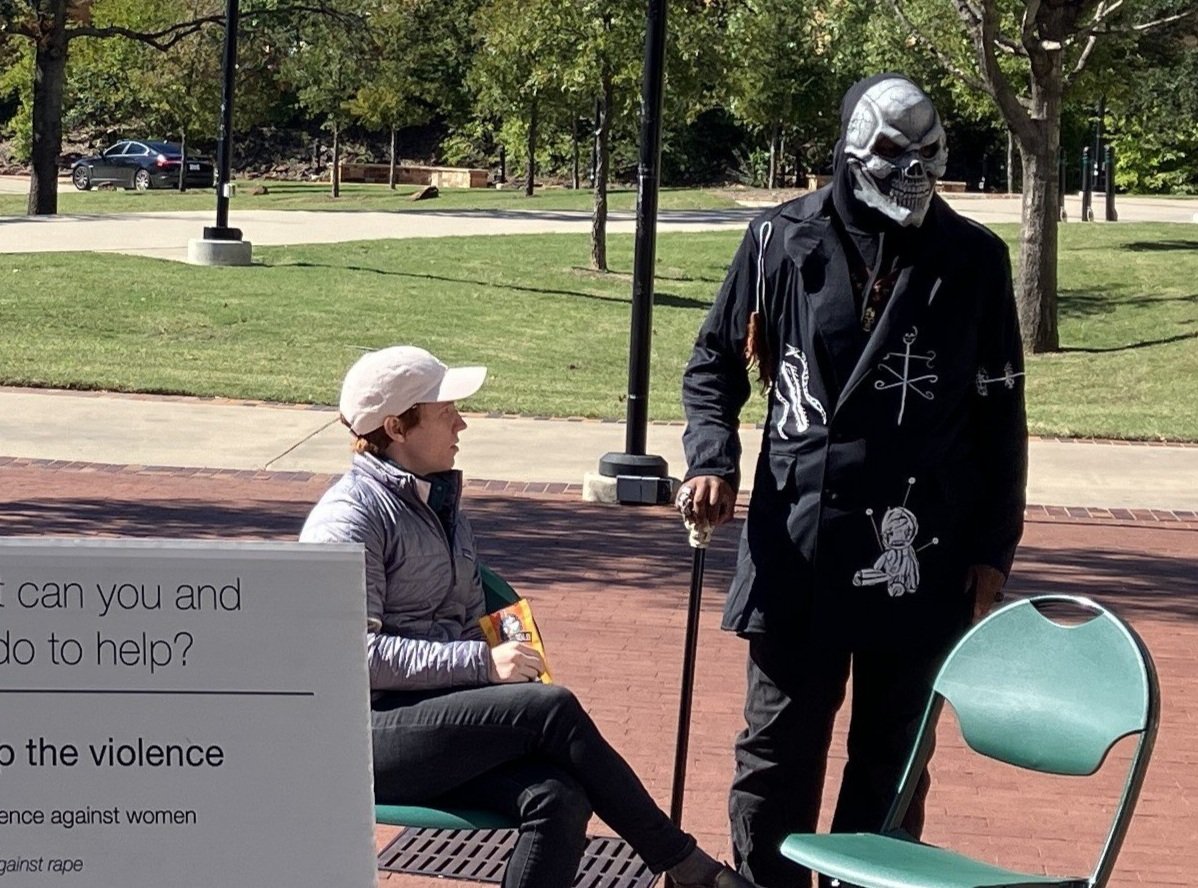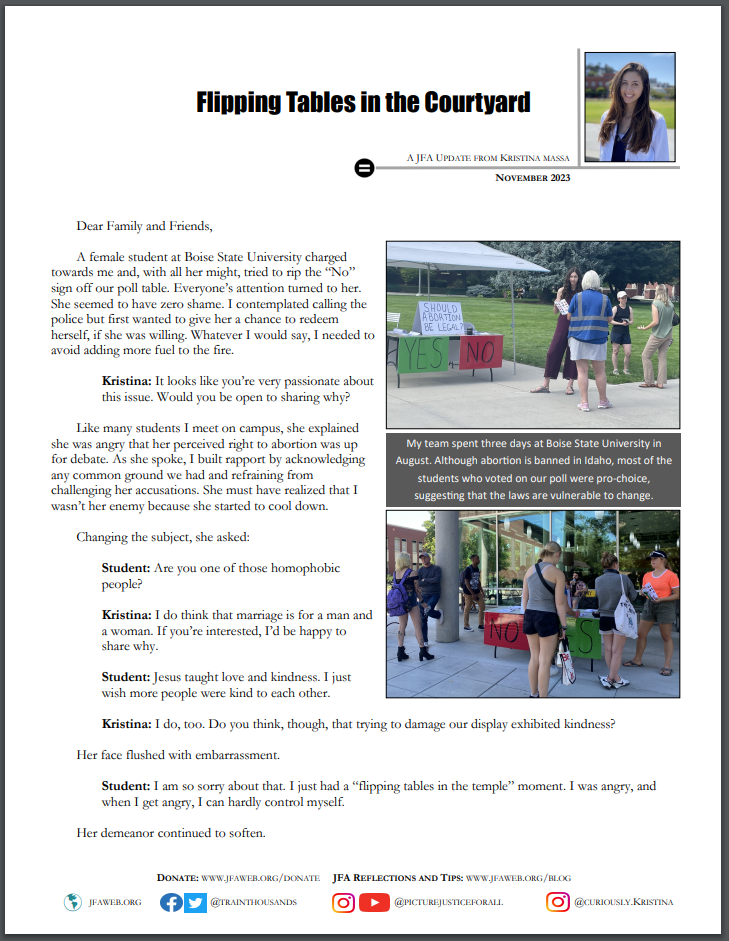At first, I did not want to talk with these students. What if they decided to direct their rude comments toward me? I had several excellent conversations that day, and I did not want to end on a discouraging note.
Then I decided I wanted to finish the day having no regrets. If they did not want to engage, or if the conversation did not go well, at least I would know I had done my part by trying to dialogue with them.
I asked them if they had any thoughts on the issue of abortion. They started by saying that they are pro-choice and then began sharing with me why they thought abortion should be legal. Christy, a member of the Students For Life club on campus, asked if she could join the conversation. Our conversation went something like this:
Sophia: I have seen so much suffering in this world. I just want to prevent kids from having to experience suffering. I think abortion should be legal for that reason. It would be more compassionate to end the life of the unborn when they are not conscious or aware of what is going on.
Jessica: There are many children suffering in foster care. We need to change the foster care system if abortion is going to be illegal.
Christy: Can I ask you a question? Imagine that there is a group of kids in the foster care system. Would it be okay to kill them to help relieve the suffering they are experiencing?
They agreed that would not be right, but then they noted differences between these kids and the unborn:
Jessica: At that point they are already in this world.
Sophia: The unborn is different, and I just want to prevent the child from experiencing pain and suffering.
Jessica: I have two siblings who have been in the foster care system. It was very hard on them.
In that moment, I sensed that they had a story to share. I realized that I needed to just listen.
Sophia: I have had a hard life. Many people in my life have died. Yesterday, my friend told me that her mom recently passed away after she had been missing. I also attended a school where we were frequently on lockdowns due to shootings. At first it was terrifying to attend school every day knowing that I might get shot. I eventually stopped fearing death and accepted that I could die. As the conversation continued, both of these young women expressed that they don’t have hope.
Andrea: Thank you for sharing. Everyone has a story, and it is important to listen to one another. I want people to know that I care about them. You never know what someone is going through or has gone through in their life.
Sophia: I can tell that you care.
She started to tear up, and I reaffirmed my concern for her. After a few minutes, it seemed helpful to note why we were on campus and how that related to listening to individual stories.
Andrea: JFA is a pro-life organization. The heart behind our outreach is to create healthy and productive dialogue about abortion. That means it’s important to hear where each person is coming from.
Sophia: I agree that it is important to talk about this issue. We can bring both sides to the table and listen to each other.
Andrea: This is the way I look at it: If the unborn are living human beings like you and me, then abortion is taking a life. I think we need to protect the unborn. If the unborn are not human beings, then it does not matter if someone gets an abortion. You mentioned earlier that abortion is a choice. I think choice is good as long as it does not harm another human being. This is why I am pro-life, but I think that pro-life should not end at birth.
They looked at each other and then Sophia exclaimed,
Sophia: I can’t believe you just said that! You are the first person I have heard say that pro-life should not end at birth. Wow! This has been a groundbreaking conversation.
As we continued talking, my heart ached for them and their lack of hope. I felt prompted to share the gospel because I know that true hope is only found in Jesus Christ. I asked a question to begin: “What gives you hope?”
We then launched into a conversation in which I was able to share in detail what Christ has done for us. Finally I said, “I share all this with you because I care about you. There is not much hope in this world, but I find my hope in Jesus. I am confident that one day I’ll go to heaven, and that gives me hope!”
Throughout our conversation, and especially during our discussion of spiritual things, Sophia and Jessica were exceptionally receptive and appreciative.
As the conversation came to a close, I thanked them for taking the time to talk. They replied, “No. Thank you. We greatly appreciated this conversation and all that you shared. So thank you!”
I thank God for allowing me to see a window into His work in their hearts. I did leave this conversation with no regrets, and I was grateful for their remarkable shift in attitude. I am reminded that not all our interactions will go like this one. Often, we do not get to see the fruit of our labor. No matter the outcome, we can focus on being faithful to plant seeds and let God do the rest. I pray that you take the opportunities God gives you in the coming weeks so you also can say, “I have no regrets” and give thanks to Him for whatever results He brings.


























